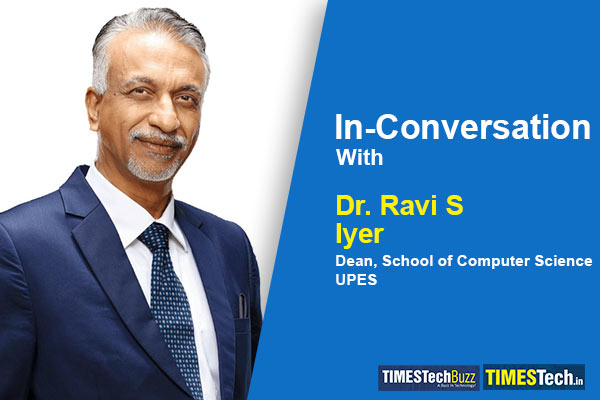Innovative inventions or advanced technologies that understand, emphasize and interact with how society acts and thinks are referred to as disruptive technology. Additionally, it alters how various firms and sectors run. TimesTech in interaction with Dr Ravi S Iyer, Dean, School of Computer Science, UPES vastly talks about emerging technologies, innovations and how disruptive technologies are transforming industries, the role Technology is playing to upskill professionals, and the necessary skills and courses required for engineers in this digital era.
Timestech: How do you think disruptive technologies are transforming traditional industries and paving the way for innovation and empowering engineers?
Dr. Ravi: Disruptive technologies are truly transforming traditional industries and opening new possibilities for creativity and problem-solving for engineers. The emergence of such technologies highlights the value of subject-matter expertise and the importance of staying up to date-with new developments. By embracing these disruptions, engineers and businesses can leverage the transformative potential of these technologies, drive innovation, and establish a competitive edge in the ever-evolving landscape of the future.
One such example is the application of Chat GPT in programming. While it is a powerful tool that can efficiently execute programming tasks, it still relies on human guidance and subject matter expertise to determine the desired results and comprehend the situation in which the code will be used. GPT indeed facilitates the programming process, but it highlights the continued importance of engineers and their expertise in solving complex, domain-specific problems. Green hydrogen is another example of advanced technology that can be looked at. In the case of green hydrogen, technological advancements are driving improvements in efficient production. Innovations such as the utilization of capillaries in electrolyzers aim to optimize the process, minimize inefficiencies, and improve overall production.
Timestech: How technology is bridging the skills gap in engineering, allowing professionals to upskill and reskill for emerging roles?
Dr. Ravi: Technology is playing a critical role in closing the skills gap in engineering and preparing professionals for emerging roles. In the context of manufacturing, computers have been integrated into the industry for several years now. In recent years the concept of dark factories where machines autonomously collaborate with each other is gaining traction, however, the management of these systems still requires human input. We need trained professionals to manage intricate supply chains to factor in multiple components, tax laws and other important regulations. To ensure smooth functioning, human intervention will always play a key role in these multi-agency deployments and in inducting new-age technologies into the system. Moreover, these disruptive technologies arrive unexpectedly and without notice, and as soon as they gain popularity, businesses hurry to adopt them. Therefore, engineering professionals must stay updated and grab these possibilities as soon as they arise. By actively engaging with emerging technologies, one can develop their technological proficiency and apply it within their respective areas. For example, exploring GPT’s capabilities beyond Chat GPT, its API offerings, and developing toy applications or Chatbots, allows individuals to grow more at ease with the technology and improve their ability to use it in their sector. As a result, they position themselves as the go-to experts for upper management when it comes to integrating these technologies into their specific sectors.
Timestech: How specialized courses are equipping aspiring engineers with the necessary skills for the digital era?
Dr. Ravi: Specialized courses equip aspiring engineers with the necessary skills for the digital era. However, the value of core courses can’t be undermined. Core subjects provide students with a strong foundation and expertise which are a must for a better understanding of concepts. Core courses offer the tools and techniques to understand and implement specializations. For instance, in the field of computer science, a fundamental course like data structures and algorithms guides students on optimizing performance. These optimizations are essential in specialized areas, as they lead to better overall performance.
Educational institutes should focus on offering a broad range of categories which align with industry demands. By doing so, they create a strong foundation upon which the industry can continue to build and develop its products. It also ensures that aspiring engineers receive a mix of strong foundational knowledge and expertise in various specializations, making themselves valuable assets for the industry. Let’s say a student is interested in developing blockchain-based products, his/her ability to comprehend the fundamentals of hash functions improves the understanding of security mechanisms like public and private keys. Consequently, the recruiting company has to invest less in training this student which results in reduced costs. Further, this results in students becoming an attractive proposition for the industry, and they can be shaped in accordance with the company’s technological preferences.
However, there is a concern that students might solely follow trends rather than deeper learning of a particular field. Two factors drive this trend-based selection: peer influence and guidance from parents, guardians, and mentors. People with solid basic knowledge can rely on the concepts that are common across industries if there is a sudden drop in demand for a particular specialization. This versatility allows them to explore other specializations and industries, leveraging their programming skills in different contexts. Therefore, foundational courses provide a safety net, making students employable across fields, while specialized courses give them an edge in specific industry segments.
Timestech: Courses offered by UPES that incorporate advanced technology in their teaching pedagogy?
Dr. Ravi: All courses offered by UPES School of Computer Sciences incorporate advanced technology in its teaching pedagogy. In today’s rapidly evolving field of computer science, it is no longer limited to theoretical concepts and mathematics. The field has expanded to include various areas of expertise and components, catering to the industry’s demands. UPES recognizes that the primary consumers of the courses are the industry, and thus we strive to make students relevant in industry contexts. Here at UPES, we not only teach the subject matter but also create an ecosystem to support holistic learning and development through hands-on experiential training and promoting continuous learning and upskilling.
Even after the students graduate, we want to ensure that they succeed in their careers. For this, we have an Alumni Nurturing Program ‘NEST’ with the aim of extending its support eco-system and resource base to the graduated student. The program has been designed in a way where the alumni can return for mentorship, entrepreneurship, and lifetime placement support.















